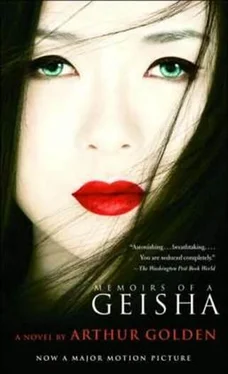I did see Mameha frequently. We had tea together at least several times a week. Considering all that she had done for me since childhood-and the special role she’d played in my life on the Chairman’s behalf-you can imagine how much I felt myself in her debt. One day in a shop I came upon a silk painting from the eighteenth century showing a woman teaching a young girl calligraphy. The teacher had an exquisite oval face and watched over her pupil with such benevolence, it made me think of Mameha at once, and I bought it for her as a gift. On the rainy afternoon when she hung it on the wall of her dreary apartment, I found myself listening to the traffic that hissed by on Higashi-oji Avenue. I couldn’t help remembering, with a terrible feeling of loss, her elegant apartment from years earlier, and the enchanting sound out those windows of water rushing over the knee-high cascade in the Shirakawa Stream. Gion itself had seemed to me like an exquisite piece of antique fabric back then; but so much had changed. Now Mameha’s simple one-room apartment had mats the color of stale tea and smelled of herbal potions from the Chinese pharmacy below-so much so that her kimono themselves sometimes gave off a faint medicinal odor.
After she’d hung the ink painting on the wall and admired it for a while, she came back to the table. She sat with her hands around her steaming teacup, peering into it as though she expected to find the words she was looking for. I was surprised to see the tendons in her hands beginning to show themselves from age. At last, with a trace of sadness, she said:
“How curious it is, what the future brings us. You must take care, Sayuri, never to expect too much.”
I’m quite sure she was right. I’d have had an easier time over the following years if I hadn’t gone on believing that Nobu would one day forgive me. In the end I had to give up questioning Mameha whether he’d asked about me; it pained me terribly to see her sigh and give me a long, sad look, as if to say she was sorry I hadn’t known better than to hope for such a thing.
* * *
In the spring of the year after I became his mistress, the Chairman purchased a luxurious house in the northeast of Kyoto and named it Eishin-an -“Prosperous Truth Retreat.” It was intended for guests of the company, but in fact the Chairman made more use of it than anyone. This was where he and I met to spend the evenings together three or four nights a week, sometimes even more. On his busiest days he arrived so late he wanted only to soak in a hot bath while I talked with him, and then afterward fall asleep. But most evenings he arrived around sunset, or soon after, and ate his dinner while we chatted and watched the servants light the lanterns in the garden.
Usually when he first came, the Chairman talked for a time about his workday. He might tell me about troubles with a new product, or about a traffic accident involving a truckload of parts, or some such thing. Of course I was happy to sit and listen, but I understood perfectly well that the Chairman wasn’t telling these things to me because he wanted me to know them. He was clearing them from his mind, just like draining water from a bucket. So I listened closely not to his words, but to the tone of his voice; because in the same way that sound rises as a bucket is emptied, I could hear the Chairman’s voice softening as he spoke. When the moment was right, I changed the subject, and soon we were talking about nothing so serious as business, but about everything else instead, such as what had happened to him that morning on the way to work; or something about the film we may have watched a few nights earlier there at the Eishin-an ; or perhaps I told him a funny story I might have heard from Mameha, who on some evenings came to join us there. In any case, this simple process of first draining the Chairman’s mind and then relaxing him with playful conversation had the same effect water has on a towel that has dried stiffly in the sun. When he first arrived and I washed his hands with a hot cloth, his fingers felt rigid, like heavy twigs. After we had talked for a time, they bent as gracefully as if he were sleeping.
I expected that this would be my life, entertaining the Chairman in the evenings and occupying myself during the daylight hours in any way I could. But in the fall of 1952, I accompanied the Chairman on his second trip to the United States. He’d traveled there the winter before, and no experience of his life had ever made such an impression on him; he said he felt he understood for the first time the true meaning of prosperity. Most Japanese at this time had electricity only during certain hours, for example, but the lights in American cities burned around the clock. And while we in Kyoto were proud that the floor of our new train station was constructed of concrete rather than old-fashioned wood, the floors of American train stations were made of solid marble. Even in small American towns, the movie theaters were as grand as our National Theater, said the Chairman, and the public bathrooms everywhere were spotlessly clean. What amazed him most of all was that every family in the United States owned a refrigerator, which could be purchased with the wages earned by an average worker in only a month’s time. In Japan, a worker needed fifteen months’ wages to buy such a thing; few families could afford it.
In any case, as I say, the Chairman permitted me to accompany him on his second trip to America. I traveled alone by rail to Tokyo, and from there we flew together on an airplane bound for Hawaii, where we spent a few remarkable days. The Chairman bought me a bathing suit-the first I’d ever owned-and I sat wearing it on the beach with my hair hanging neatly at my shoulders just like other women around me. Hawaii reminded me strangely of Amami; I worried that the same thought might occur to the Chairman, but if it did, he said nothing about it. From Hawaii, we continued to Los Angeles and finally to New York. I knew nothing about the United States except what I’d seen in movies; I don’t think I quite believed that the great buildings of New York City really existed. And when I settled at last into my room at the Waldorf-Astoria Hotel, and looked out the window at the mountainous buildings around me and the smooth, clean streets below, I had the feeling I was seeing a world in which anything was possible. I confess I’d expected to feel like a baby who has been taken away from its mother; for I had never before left Japan, and couldn’t imagine that a setting as alien as New York City would make me anything but fearful. Perhaps it was the Chairman’s enthusiasm that helped me to approach my visit there with such goodwill. He’d taken a separate room, which he used mostly for business; but every night he came to stay with me in the suite he’d arranged. Often I awoke in that strange bed and turned to see him there in the dark, sitting in a chair by the window holding the sheer curtain open, staring at Park Avenue below. One time after two o’clock in the morning, he took me by the hand and pulled me to the window to see a young couple dressed as if they’d come from a ball, kissing under the street lamp on the corner.
Over the next three years I traveled with the Chairman twice more to the United States. While he attended to business during the day, my maid and I took in the museums and restaurants-and even a ballet, which I found breathtaking. Strangely, one of the few Japanese restaurants we were able to find in New York was now under the management of a chef I’d known well in Gion before the war. During lunch one afternoon, I found myself in his private room in the back, entertaining a number of men I hadn’t seen in years-the vice president of Nippon Telephone & Telegraph; the new Japanese Consul-General, who had formerly been mayor of Kobe; a professor of political science from Kyoto University. It was almost like being back in Gion once again.
Читать дальше












